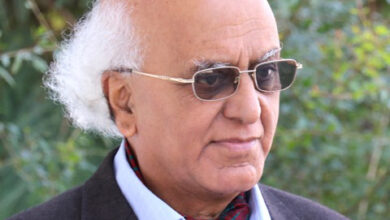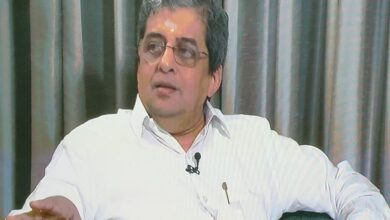The Impact of US Visa Restrictions on Bangladesh’s Democratic Process
Under this policy, the United States will be able to restrict the issuance of visas for any Bangladeshi individual, believed to be responsible for, or complicit in, undermining the democratic election process in Bangladesh.

Dhaka : On May 24th, the United States Secretary of State unveiled a new visa policy pertaining to Bangladesh. The issue at hand is not the addition of visa benefits, but rather the restriction of visa opportunities for Bangladesh based on the justification of promoting a “free and fair” general election and advancing democracy.
The US’s visa restrictions on those who may interfere with Bangladesh’s free and fair election violate Article 21 of the UDHR, which outlines democratic principles. This ensures everyone’s right to participate in the government of their country by stating that the will of the people should be the foundation of governmental authority and that everyone has the right to do so directly or through representatives who have been elected at their own discretion. The government of Bangladesh is dedicated to conducting impartial elections, and the populace of Bangladesh possesses the prerogative to determine their forthcoming administration. The principle of non-interference in the internal affairs of other nations should be upheld by the United States with regards to Bangladesh.
The US visa restrictions constitute a breach of Article 2, which ensures freedom from discrimination. Article 2 prohibits discrimination based on a person’s political, jurisdictional, or international affiliation, regardless of whether the country or territory is independent, under trust, non-self-governing, or has limited sovereignty.
Visa restrictions imposed by a major global power such as the US pose a challenge to Bangladesh’s efforts to enhance its democratic framework. The situation presents a challenge for the government, requiring it to balance complex geopolitical factors with the protection of its sovereignty and the democratic aspirations of its people.
Comprehending the relationship among geopolitics, democratic processes, and external interventions is imperative as the worldwide political landscape progresses. This article analyzes the impact of the US visa restriction threat on Bangladesh’s democratic process, specifically in light of the current political climate. The author examines US Secretary of State Blinken’s announcement and its implications for Bangladesh’s national sovereignty and democratic principles within the context of contemporary geopolitics.

First Sentence:
‘Today, I am announcing a new visa policy under Section 212(a)(3)(C) (“3C”) of the Immigration and Nationality Act to support Bangladesh’s goal of holding free, fair, and peaceful national elections.’
The Immigration and Nationality Act (INA)’s Section 212(a)(3)(C) permits the U.S. government to refuse entry to non-citizens who have participated in or are expected to engage in terrorist actions. The provision was implemented following the terrorist attacks on September 11, 2001, and has been utilized to refuse entry to several individuals suspected of engaging in terrorist acts.
Blinken has warned Bangladesh of potential consequences under Section 212(a)(3)(C) of the INA, a policy aimed at individuals deemed by the US to be terrorists. The act has faced criticism for its broad scope, as it empowers the US government to refuse entry to non-citizens who have not committed any acts of terrorism. The term “terrorist activity” is defined as actions that employ violence or the prospect of violence to intimidate or coerce a civilian population, or to affect the policies of a government through intimidation or coercion. The definition is broad and encompasses various activities, including peaceful protests and political activism. The US possesses an unfair ability to utilize its visas as a means of weaponization against Bangladesh in order to change the regime.
This action appears to specifically target Bangladesh in anticipation of their upcoming general election in early 2024. Over 15 nations are scheduled to hold general elections in 2024. The aforementioned countries are Chad, Mauritania, Egypt, Algeria, Mali, Rwanda, Somaliland, Comoros, South Africa, South Sudan, Tunisia, India, Indonesia, South Korea, Sri Lanka, Taiwan, Austria, Belgium, Croatia, Finland, Germany, Georgia, Lithuania, Moldova, North Macedonia, Portugal, and Romania. Has the United States implemented a similar policy for other nations? The response is negative.
What are the reasons for choosing Bangladesh?
The United States is utilizing and politicizing the Visa issue for Bangladesh, with two factors at play. The US has a growing interest in the Indo-Pacific region, particularly in the Bay of Bengal, as a strategic location to counter China. Additionally, there is a perceived hostile political environment in Bangladesh that is believed to be influenced by Western powers. The US is leveraging political animosity and fragmentation to promote its geopolitical and geostrategic objectives, constraining China’s economic and strategic sway in the area by fomenting disorder and uncertainty. The possibility of a Visa ban has the potential to cause political instability and hinder Chinese projects in Bangladesh.

Second Sentence:
Under this policy, the United States will be able to restrict the issuance of visas for any Bangladeshi individual, believed to be responsible for, or complicit in, undermining the democratic election process in Bangladesh.
Blinken’s statement suggests that the US has issued a threat to Bangladesh by weaponizing its visa policy. Due to the lack of mutually agreed upon methods for determining accountability in elections, the US may take unilateral actions in Bangladesh based on their assessment, potentially influenced by their political interests and pursuit of geopolitical advantages.
In the ‘2022 Country Reports on Human Rights Practices: Bangladesh’, which was published by the US Department of State, the US considers that ‘’Bangladesh’s constitution provides for a parliamentary form of government that consolidates most power in the Office of the Prime Minister. In a December 2018 parliamentary election, Sheikh Hasina and her Awami League party won a third consecutive five-year term that kept her in office as prime minister. This election was not considered free and fair by observers due to reported irregularities, including ballot box stuffing and intimidation of opposition polling agents and voters.’’
The US visa policy targets the current Awamileague government for allegedly not conducting a fair election in 2018. The US has utilized visa restrictions as a means to effect regime change in Bangladesh, specifically targeting individuals associated with the Awami League and its supporters. The US believes that this announcement will surprise influential members of the Awami League who have a vested interest in settling in the US with ill-gotten funds. However, alternative perspectives may exist regarding the situation. This approach may enhance the Awami League’s power by providing opportunities for grassroots politicians with strong ideological convictions to assume high-ranking positions. These individuals are less susceptible to the corrupting influence of the US visa system, which requires bribery to navigate. The premium branding of US visas in South Asia aims to attract individuals who can contribute to the development of the US economy and the maintenance of its infrastructure. Visa recipients from South Asia experience a modern lifestyle in the US and a favorable reputation in their home countries. The issuance of US visas to South Asians has become a coveted opportunity, providing the US with the ability to attract and potentially manipulate influential individuals in a specific country to further their objectives.
Third Sentence:
This includes current and former Bangladeshi officials, members of pro-government and opposition political parties, and members of law enforcement, the judiciary, and security services.
This statement from the US State Department is perceived as a balancing act that obscures the underlying motive of implementing a regime change. Nonetheless, it can also serve as a means to expand the scope of visa sanctions against particular entities that are largely under the control of the governing political party.

The latest US state department report says, ‘’There were reports members of the security forces committed numerous abuses. Significant human rights issues included credible reports of: unlawful or arbitrary killings, including extrajudicial killings; forced disappearance; torture or cruel, inhuman, or degrading treatment or punishment by the government; harsh and life-threatening prison conditions; arbitrary arrests or detentions; political prisoners or detainees; transnational repression against individuals in another country; serious problems with the independence of the judiciary; arbitrary or unlawful interference with privacy; punishment of family members for offenses allegedly committed by a relative; serious restrictions on free expression and media, including violence or threats of violence against journalists, unjustified arrests or prosecutions of journalists, censorship, and enforcement of or threat to enforce criminal libel laws to limit expression; serious restrictions on internet freedom; substantial interference with the freedom of peaceful assembly and freedom of association, including overly restrictive laws on the organization, funding, or operation of nongovernmental organizations and civil society organizations; restrictions on refugees’ freedom of movement; serious and unreasonable restrictions on political participation; serious government corruption; serious government restrictions on or harassment of domestic and international human rights organizations; lack of investigation of and accountability for gender-based violence, including domestic and intimate partner violence, sexual violence, workplace violence, child, early, and forced marriage, and other forms of such violence; crimes involving violence or threats of violence targeting members of ethnic minority groups or Indigenous people; crimes involving violence or threats of violence targeting lesbian, gay, bisexual, transgender, queer, or intersex persons; laws criminalizing consensual same-sex sexual conduct between adults; significant restrictions on independent trade unions and workers’ rights to freedom of association and collective bargaining; and existence of the worst forms of child labor.’’
It is clear from the above statement from the US state department that the US holds a serious stance against the ways the present government is running the country. And very interestingly, the neighboring countries and regional powers like India or China both have very different views than the US of the political and human rights situation in Bangladesh.
Fourth Sentence:
The United States notified the Bangladeshi government of this decision on May 3, 2023.
On May 3rd, the United States communicated a policy decision to the government, which was subsequently made public on May 24th. The nature of the decision that was being formulated within the US state department during the aforementioned 21-day period remains unknown. What was the reason for the State Department to exclusively inform the officials on May 3rd? What was the rationale behind the US State Department’s decision to refrain from disclosing the information to the public? Currently, there is a lack of definitive response to this inquiry. It is possible to surmise that they engaged in the reception and analysis of governmental reactions and responses for a period of several weeks prior to disseminating the information to the general populace.
Fifth Sentence:
Actions that undermine the democratic election process include vote rigging, voter intimidation, the use of violence to prevent people from exercising their right to freedoms of association and peaceful assembly, and the use of measures designed to prevent political parties, voters, civil society, or the media from disseminating their views.

By issuing this statement, the United States may position itself as the exclusive enforcer and arbiter of the democratic electoral process in Bangladesh. The United States intends to independently determine the occurrence of vote manipulation and other illicit activities during the electoral process. This decision is based on the belief that their observers, social media, anti-government activists residing overseas, think tanks, pro-western civil society, local agents, and all policy-strategy implementing actors possess sufficient capacity to exert political pressure during the election process, ultimately resulting in a change of regime. Nonetheless, it is important to note that not all prominent leaders of the Awami League can be characterized as subservient to the West. While there may be some individuals who exhibit a significant reliance on the United States, it is possible that their allegiance to their dependency may supersede the interests of their nation or political party during times of crisis. Individuals may become subject to the weaponization of US visas and seek to find a means of escape. Nevertheless, it is imperative to acknowledge the significance of these vulnerable individuals as they have the potential to undermine Awamileague’s chances of success.
The current government could implement countermeasures to restrict these activities through alternative methods, rather than relying solely on the display of law enforcement agency strength. This may involve seeking international support from countries such as India, China, Japan, Saudi Arabia, and Russia, with the aim of discouraging the interference in the general election of Bangladesh by the United States. Moreover, it is advisable for the Awamileague to exercise prudence in mobilizing its party members and commence the electoral campaign. It is imperative for the government to implement additional measures to curb the proliferation of false information, which poses a significant risk to the stability of the nation. Remember that disseminating views and disseminating fake news are two very separate things that shouldn’t be confused There is a chance that those who oppose stability in Bangladesh will make choices based on fake news. There exist numerous occurrences in which the United States unilaterally made decisions predicated upon fabricated news with the intention of manipulating or obstructing public perception of a given event.
The United States, with its headquarters located approximately 8500 kilometers from Bangladesh, aims to establish itself as a prominent global player in the realm of Bangladesh’s domestic politics. To US Indo-Pacific policymakers, the matter may represent a distant adventure, but for Bangladeshis, it has the potential to serve as a source of political instability in the country for an extended period since it will open the floodgate of influence and interference for other regional powers like India and China.
Sixth Sentence:
‘The holding of free and fair elections is the responsibility of everyone—voters, political parties, the government, the security forces, civil society, and the media.’
This appears to be a segment of a lecture pertaining to the principles of free and fair elections, with the speaker expressing uncertainty regarding the audience’s comprehension of the aforementioned concepts and their practical application. The lecture on ‘free and fair’ elections, which is generic, holds little relevance to this announcement as the responsibility of conducting such elections is a universal one. There is a concern regarding the potential involvement of the United States in the aftermath of the 1970 election, wherein the Awami League emerged victorious and was subsequently prevented from governing Pakistan. Specifically, it is queried whether the US government issued a visa ban or a similar measure against the ruling Pakistani administration. Once more, the response is firmly negative.

What is the definition of the terms “Free and Fair”?
From the perspective of Bangladesh, the concept of “free and fair” entails the provision of equitable opportunities to both opposing parties in politics. In Bangladesh’s specific context, ensuring fair and free elections is a formidable challenge for the government and the election commission. This is due to the disruptive impact of foreign influence on politicians and the election process, which can encourage miscreants to incite instability. Conversely, it is accurate to assert that the attainment of political stability, as opposed to the utilization of violent methods to enforce democratic principles, is of greater necessity for the populace of Bangladesh. This is due to the fact that it fosters economic adaptability and a sense of acceptance within all societal strata and cultural backgrounds. Simultaneously, individuals ought to assume a constructive function in the administration instead of solely criticizing it. It is an indisputable reality that attaining a wholly free and fair election in Bangladesh is unattainable as long as external forces such as the United States, India, and Pakistan, who possess significant political power and influence in Bangladesh, continue to intervene in the nation’s domestic affairs. During electoral periods, Bangladesh is often characterized by a contest of external influences, with some asserting that these contests have a greater impact on the country’s future than the expressed desires of its citizenry. The current state of affairs regarding free and fair elections in countries such as Bangladesh is a cause for concern, as it is heavily reliant on the global economic mechanisms of the United States.

Seventh Sentence:
I am announcing this policy to lend our support to all those seeking to advance democracy in Bangladesh.
The statement appears to resemble the message of a messianic figure. It appears that the citizens of Bangladesh have turned to the United States for assistance in addressing their stagnant democracy, which has failed to progress. In response to the issue at hand, the United States, acting as a savior, has implemented a resolution by means of visa restrictions.
What are the ways to advance a democratic society? There exist multiple strategies to promote democracy in Bangladesh without relying on external assistance from the United States, given that democracy is already established in the country. It is undeniable that Bangladesh has a democratic system in place, and the United States cannot refute this fact. The United States seeks a change in regime in Bangladesh with the aim of containing China and promoting democratic progress. Jokes aside, we need to be critical of western democracies because they have had negative social effects on western societies, such as societal segregation, irresponsible behavior under the guise of freedom, pervasive super surveillance, money-based relationships, a propensity to violate family values, a diet of factory-produced foods, depression, racism, and a desire to exterminate species, including humans. Do we want Bangladesh to experience the results of western democracy in this way? Is there any democratic element in western democracy? Alternatively, it can be likened to lemon-flavored candies that lack actual lemon or lemon extract, but instead rely on a chemically-produced lemon flavor.
Hence, in order to establish an advanced democracy, it is recommended that Bangladesh refrain from emulating Western models and instead explore traditional methods to foster political engagement among its populace. The primary objective of democracy in Bangladesh ought to be centered on enhancing the self-determination of the marginalized and disadvantaged demographic economically, rather than catering to the geopolitical agenda of the United States.
Rajeev Ahmed, Geopolitcal Analyst, Strategic Thinker and the Editor at geopolits.com




